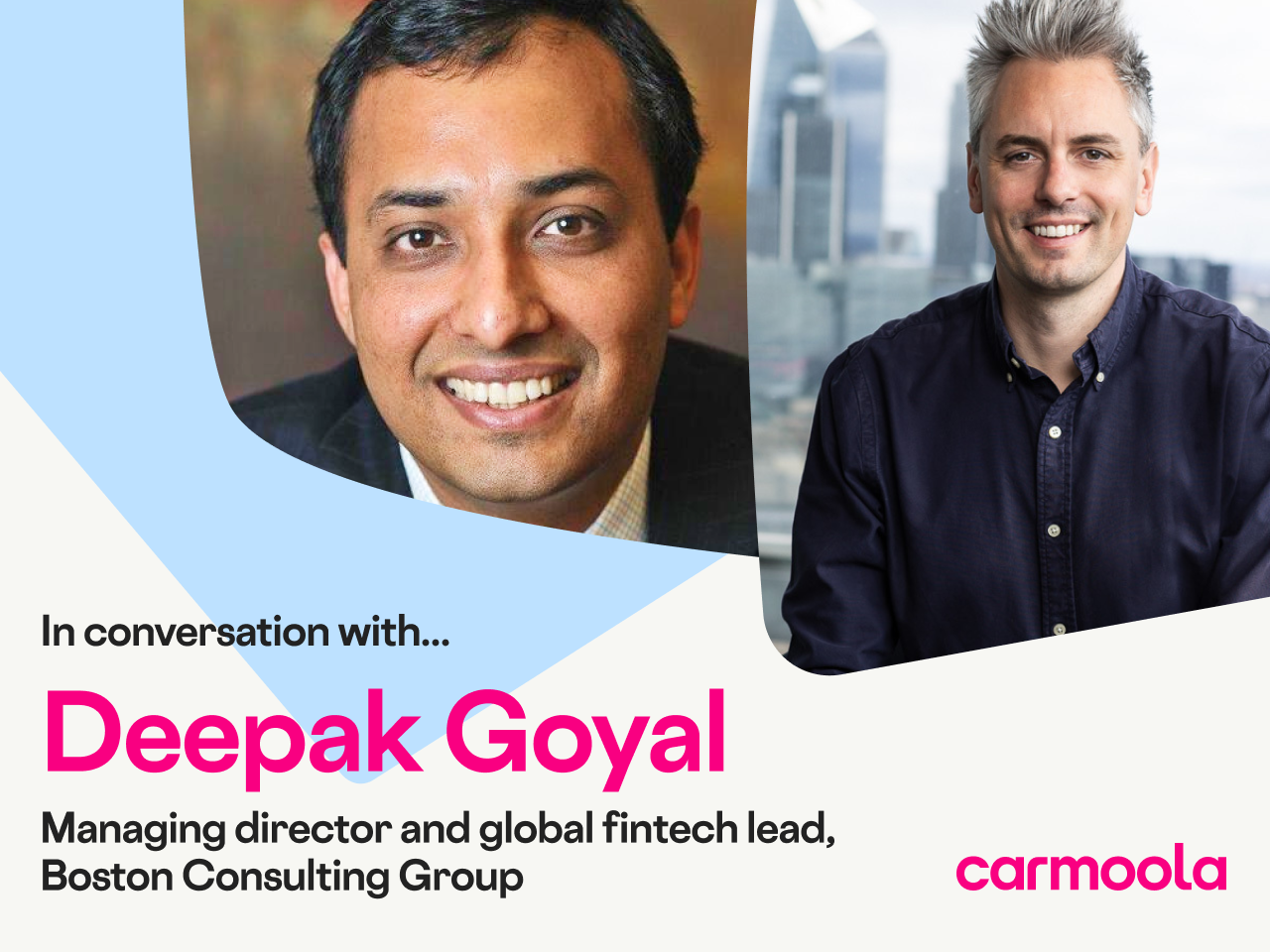- 🗞 News
- Last updated: Feb 4, 2025
- 6 Min Read
In Conversation With... Deepak Goyal
Written by

Verified by


See how much you can borrow in 60 seconds
| Representative Example | |
|---|---|
| Loan amount | £10,000 |
| Interest rate | 13.9% APR |
| 54 payments of | £246 |
| Total cost of credit | £3,284 |
| Option to purchase fee | £1 |
| Total payable | £13,285 |
We love bringing bright minds and interesting people to our company calls to share their expertise with our team. This time, we had the privilege of hosting Deepak Goyal, a seasoned consultant with over 28 years’ experience, 20 of which have been with Boston Consulting Group (BCG), where he spearheaded the organisation’s global fintech practice. Deepak shared his insights into the evolving fintech landscape, the role of AI, and what the future holds for financial services.
Here are some of the key takeaways from this fascinating conversation, and you can watch it in full below:
Fintech’s story has only just begun 📚
Reflecting on the fintech market's recent challenges, Deepak touched on the "doomsday" sentiment that gripped the industry in early 2023. Valuations and funding plummeted, but Deepak’s research showed that the fundamentals of fintech remained strong. Despite investor sentiment shifting, the global fintech revenue pool continued to grow.
"We’re still in the first paragraph of the first chapter of fintech’s story," said Deepak, emphasising the enormous potential of a $12.5 trillion global financial services market, where fintech currently holds only a 2% share. The message was clear: fintech is far from a passing fad.
Key trends in fintech 📊📊
Deepak shared five key insights from a recent BCG fintech report:
- Strong fundamentals: Fintech’s growth trajectory remains robust, with revenue pools expanding despite market turbulence. "Even in the worst time of fintech history, the market grew 21% for fintechs," he noted, underlining the sector’s resilience.
- Embedded finance: Financial services are increasingly adopted as part of non-finance journeys. "Financial services are best consumed in a non-finance journey," Deepak said, mentioning the seamless payment experience during an Amazon checkout as a prime example, and one that has set new expectations for ease among consumers.
- Connected commerce: Financial institutions are leveraging customer data to create personalised offers. "A global financial services firm’s decision to use its data about its customers to make offers was a game-changer," and is an example of how even the most conservative institutions are embracing innovation.
- Profitability over growth: The "growth at all costs" mentality is being replaced by a focus on sustainable, profitable growth - a lesson learned from the market corrections of 2023. Deepak said, "You can do growth at the expense of profitability in the early stages, but by the time you’re in the growth stage, profitability starts to matter more and more." This is something we strongly believe in at Carmoola, and is one of the reasons for our new company value - ‘spend it like it’s yours’ - which you can read more about in our review of 2024.
- Government intervention: The need for responsible regulation to foster innovation was touched on, with Brazil’s PIX payments system cited as a success story in contrast with the fragmented U.S. payments landscape. "The U.S. is one of the least developed payments markets in the world," Deepak noted.
The AI revolution in financial services 🤖
You can’t have a conversation about innovation and trends without AI making an appearance, especially as it’s one of the hottest topics in fintech today. Deepak broke down AI use cases into three categories: automation of small tasks, productivity improvements, and entirely new revenue-generating products and services. He shared compelling examples of AI adoption:
- Customer support: Companies like Klarna have drastically reduced customer service workloads using AI, automating up to 70% of interactions. As Deepak said, even traditional banks are using AI to handle simple queries more efficiently.
- Software development: Tools like Microsoft Copilot are enhancing productivity by up to 30%, with even greater potential on the horizon. "A global investment bank is already seeing a 10% productivity improvement, and this could go as high as 2x," according to Deepak.
- Document management: AI is transforming processes that involve unstructured data, such as mortgage applications. Paperwork is extensive, and often for good reason, in financial services, but AI can automate much of the heavy lifting here.
- Digital marketing: From creating personalised campaigns to responding to customer enquiries, AI is becoming indispensable.
Deepak also noted the importance of effective change management to fully leverage AI’s potential, and that success hinges on aligning operations with technology. "Think of AI as 10% algorithm, 20% data, and 70% business process reengineering," he advised.
"If you don’t reengineer the process, you can have the best AI and nothing will get used.”
Opportunities and challenges ahead 🗺️
One of the standout insights from the talk was Deepak’s take on the evolving dynamics of profitability and growth. He urged early-stage companies to focus on achieving product-market fit and responsible growth, while growth-stage companies should balance expansion with profitability. He shared anecdotes from fintech’s "go-go years," when reckless spending overshadowed fundamentals, and contrasted this with today’s more measured approach.
Deepak said, "Many fintechs were pricing consumers below the cost of provision, just buying market share. You can do that for a year or two, but not forever."
On AI’s future impact, Deepak was optimistic: "There’s absolutely zero doubt in my mind that AI will be a fundamental force in fintech. Fintechs’ ability to experiment and innovate faster will place them at the leading edge."
Consumer adoption of AI 🦾
In addition to his business ventures, Kevin is deeply committed to philanthropy. He discussed his involvement in initiatives to support underrepresented founders and nonprofits. AlleyCorp has offered engineering resources to nonprofits, helping them build crucial projects that they otherwise couldn't afford.
Final thoughts 💬
This insightful conversation made one thing particularly clear: resilience and innovation are abundant within fintech. From navigating market challenges to embracing AI’s transformative power, the industry is poised for remarkable growth and to have a significant impact on consumers.
As a company, we’re proud to be part of this journey and to be building technology, and processes, to make a tangible difference to our customers’ lives.
For more inspiring stories and insights from industry leaders, stay tuned to the Carmoola blog. And if you haven't already, check out our previous conversations with Nigel Morris, Matthew Dicks and Keyin Ryan.
See how much you can borrow in 60 seconds
| Representative Example | |
|---|---|
| Loan amount | £10,000 |
| Interest rate | 13.9% APR |
| 54 payments of | £246 |
| Total cost of credit | £3,284 |
| Option to purchase fee | £1 |
| Total payable | £13,285 |
Related articles
Can you drive in the UK on a foreign licence?
If you’re new to the UK, you might be keen to get behind the wheel to explore on the open road. You can usually drive in the UK...
What happens if my car is written off and it’s still on finance?
Accidents happen. When split-second decisions and challenging conditions make driving difficult at the best of times, even the...
Which credit reference agencies do lenders use?
When applying for car finance, your credit score can make a significant difference to the APR you’re offered, your repayment...

.webp?width=832&height=592&name=customer-support%20(1).webp)










.webp?width=400&height=285&name=online-shoppers-with-dog%20(1).webp)


.jpg?width=500&height=356&name=Vintage%20car%20going%20to%20an%20old%20town-1%20(1).jpg)





